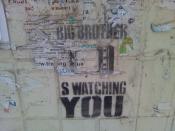In 1984, Orwell makes excellent use of symbolism to further enhance the novel's themes. Orwell wrote 1984 as a political message to warn future generations about the dangers of totalitarian societies. He urgently relays this message through various themes, and in turn utilizes powerful symbols to give these themes further significance. Psychological and physical control is a theme that Orwell religiously includes throughout the novel. Symbols such as doublethink and the telescreens provide a direct connection to this theme. Another theme apparent in 1984 is that of intellectual rebellion and the desire to diverge against a higher authority. Orwell, through Winston's journal and glass paperweight, manages to use these symbols to assist in the portrayal this theme.
One of the party's main goals is to control its people's thoughts. By deliberately weakening one's recollection of the past and flooding their minds with propaganda, the Party is able to replace individuals' memories with its own version of the truth.
Winston, however, struggles to try and remember his history. He is persistent in trying to make sense of what has happened to the world. In turn, he buys a glass paperweight in an antique store, which symbolizes his attempt to connect with the past. "And when memory failed and written records were falsified?when that happened, the claim of the Party to have improved the conditions of human life had got to be accepted, because there did not exist, and never again could exist, any standard against which it could be tested." This is when Winston, after conversing with an old man, realizes that the Party has deliberately set out to weaken people's memories in order to control their fabricated version of the present. When The Thought Police arrests Winston for his attempts to recall the past, the glass paperweight shatters. It is...



I like it
You have understood the symbolisms in the book very well.
0 out of 1 people found this comment useful.